|
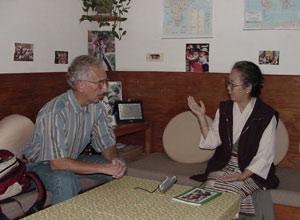 Al:
I would like you to give my readers and me an overview of the Tibetan
Children's Village. Dr. Norbu, the Dalai Lama's brother, was insistent that
when I got to Dharmasala I would visit TCV. He is looking forward to my
report when I return to the States. Al:
I would like you to give my readers and me an overview of the Tibetan
Children's Village. Dr. Norbu, the Dalai Lama's brother, was insistent that
when I got to Dharmasala I would visit TCV. He is looking forward to my
report when I return to the States.
Tashi: TCV was started in early 1960 soon after the
Tibetans became refugees and arrived in India seeking asylum. It started with
fifty-one children. Many of the children's parents had died in the course of
their journey. The survivors were walking on the road construction sites in
the Himalayan ranges.
His Holiness' sister personally shouldered many
of the responsibilities of looking after these children. Everything was in
short supply from food to medicine to clothes-to everything. His Holiness'
entourage took very good care of the children, and His Holiness visited the
children very frequently. These children were then housed in the old Common
House left over from the British period and isn't very far from where we stand
today. The children were sleeping on the floor along with the adult members
that were helping them. You would find twenty children living under one
blanket on the floor. It was a very bleak and terrible situation, but it was
a period of emergency.
We had help coming in from different parts of
India and from abroad. We had volunteer teachers, nurses, doctors, and all
different types of people that just offered assistance. His Holiness' sister
unfortunately passed away not many years after she had started TCV. Her
younger sister then shouldered the responsibility. The Tibetan's Children's
Village assisted all the children that flooded into the village. We have
today over 14,200 children in five residential schools.
Al: What are the locations?
Tashi: They cover a large part of India.
Al: I was in Kathmandu and visited the refugee camp
in Paton. Is that part of the TCV?
Tashi: It could be a private school-a school run by
Tibetans for Tibetan children. That is what I guess.
Al: So, TCV is basically in India. Where are the
major funding sources from?
Tashi: We have a scholarship program and sponsors
come from more than twenty-six different countries. Then for major projects
different NGO's or individuals support us.
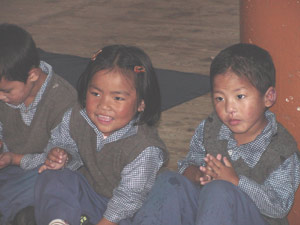 Al: Can you tell us something about what a day in
the life of a child would be like?
Al: Can you tell us something about what a day in
the life of a child would be like?
Tashi: Life starts quite early in the Children's
Village. Most of the children are up by 5:30am. If you imagine a home with a
mother, who takes care of thirty to forty children ranging from four-years to
sixteen-years of age. You have a good picture of what is happening in the
house from the start of the morning-chaos. Sometimes, there is a little more
chaos than one can imagine. Basically, the housemother arranges her work.
Most homes have this age group of children where both boys and girls in the
older age group help the housemother by way of looking after a younger child.
It relieves a lot of tension for the housemother. It is actually a very big
family with many boys and girls together. They live there many years of their
life and share everything in the house. They share the responsibility of
every chore whether it is washing dishes, cleaning the floors, washing the
clothes, cooking, or whatever. Everybody has a responsibility. Even the
little ones pick up papers or waste from around the house or the Village.
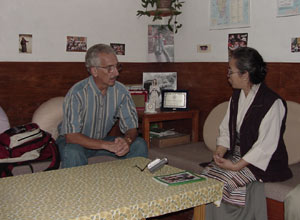 When they get
up in the morning at 5:30, they wash up and then they do their chores around
and then they have classes. By 7:00am, they have to be on the school
premises for morning prayer followed by one-hour of studies. We have two
different programs; we call it the summer program and the normal program.
This time of the year is the summer program, which means school starts already
after 7:00. One-hour period of study and then a break followed by
another two-hour period of school. Then it is lunch break and then there
is no school in the afternoon. In this way, the children get more time
for cultural or other activities after the school period. About 4:00pm,
we have tea and then we go back again on the grounds for games or whatever.
By 6:00pm, they eat and by 6:30 they are ready for another one hour self
study. By 9:00pm, lights should be off.
When they get
up in the morning at 5:30, they wash up and then they do their chores around
and then they have classes. By 7:00am, they have to be on the school
premises for morning prayer followed by one-hour of studies. We have two
different programs; we call it the summer program and the normal program.
This time of the year is the summer program, which means school starts already
after 7:00. One-hour period of study and then a break followed by
another two-hour period of school. Then it is lunch break and then there
is no school in the afternoon. In this way, the children get more time
for cultural or other activities after the school period. About 4:00pm,
we have tea and then we go back again on the grounds for games or whatever.
By 6:00pm, they eat and by 6:30 they are ready for another one hour self
study. By 9:00pm, lights should be off.
The housemother is always in the house with the children. If you were working on
a fine sunny day, you would find even the very young children peeling
potatoes. That is a sight to see, because that shows that they are a part of
the family by sharing in the responsibilities. We do not want our children to
grow up just being able to read and write. We want them to grow up a
wholesome, responsible youth being able to take reins of their life whatever
situation they are faced with. If young boys go off to college, they are not
alien to kitchen utensils.
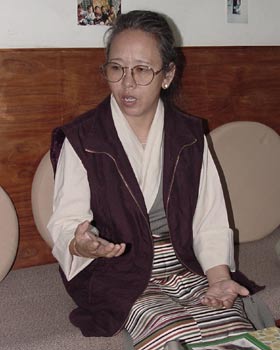 Al: At what age do they go to college?
Al: At what age do they go to college?
Tashi: It depends. We have a lot of children who
come out of Tibet who have had no formal education. Some arrive here at ten
or eleven without much education. They have to start with basic education,
which might take them three or four years in the elementary education. Some
don't go to college until their early twenties. Others merely get a basic
education with vocational training.
Al: What percentage leave to go to college or
vocational training?
Tashi: About 40% go to college and most of the rest
join the vocation-training center. At the vocation center, they have the
opportunity to learn a wide range of skills. Some of them are lost between
high school and college and do not have the aptitude quite for college. We
found that we were loosing a lot of those students. With the center, it is
the hope that many of these young people will acquire skills that will take
them forward in their lives.
Al: Are there many refugees still coming here from
Tibet?
Tashi: In most cases, we have in a year an average
of five hundred that come across the border. In most cases, children are
accompanied by Tibetan traders between Nepal and Tibet. Sometimes, young boys
have come on their own. They come in groups or with somebody who has a little
knowledge about the route. In most cases, other Tibetans bring in children.
Traveling between the two nations is very difficult. It is quite sad to
listen to the stories of young children and how they escaped. It is a
treacherous trip whatever the age. They start out not knowing whether they
will survive and arrive in India safely. In addition, seeing some travelers
die on route, it's very difficult. They come and have to endure all that
difficulty.
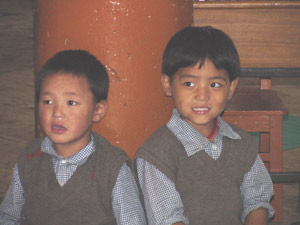 Al: It's not just the transit from Tibet to India;
it's living in Tibet today that can be frightening. When I was in Tibet, I
was afraid to say anything to anyone because I didn't know who they really
were. I wasn't even sure about our Tibetan guides.
Al: It's not just the transit from Tibet to India;
it's living in Tibet today that can be frightening. When I was in Tibet, I
was afraid to say anything to anyone because I didn't know who they really
were. I wasn't even sure about our Tibetan guides.
Tashi: You never know.
Al: We were at the Jokhang Temple, and I was sure
that some of the monks were spies. I caught one peeking over the roof. Does
it takes the children long to adjust to freedom and to an open society after
living in occupied Tibet?
Tashi: Most children do not feel so comfortable at
all or adjusted to peace or just being safe until they have had His Holiness'
blessing. I feel that in all cases they are just waiting for an opportunity
to have his blessing or just to see him speak. After that moment, all feel
safe, and they just feel that they can now talk. Until then, everything
around them seems suspicious. It is just living under that fear of being
watched and followed that troubles them. So His Holiness' blessing is the
opening to a new life for them.
Al: How does His Holiness maintain his presence in
Tibet in such a closely controlled society? They can't even have pictures of
him.
Tashi: They just keep him in their hearts. That is
the safest, because one would never want to trust anybody. I think that is
the only way to be safe and survive in Tibet by keeping his presence in your
heart.
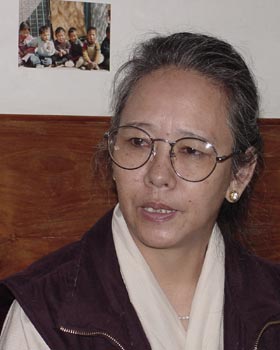 Al: Dr. Norbu is interested in perpetuating Tibetan
cultural and lifestyle. How can you keep religion, culture, and dance alive?
I'm troubled by the fact that Tibetans have two handicaps: one Chinese and
the other is the Internet, television, radio from the West. Society is going
to change. I'm trying to wrestle with what is the essential; you are not
going to save everything in Tibet the cultural things here even if you were
back in Tibet. What are the essentials to make you really Tibetan other than
something else and then how is that carried our here with the children,
because that is really the future.
Al: Dr. Norbu is interested in perpetuating Tibetan
cultural and lifestyle. How can you keep religion, culture, and dance alive?
I'm troubled by the fact that Tibetans have two handicaps: one Chinese and
the other is the Internet, television, radio from the West. Society is going
to change. I'm trying to wrestle with what is the essential; you are not
going to save everything in Tibet the cultural things here even if you were
back in Tibet. What are the essentials to make you really Tibetan other than
something else and then how is that carried our here with the children,
because that is really the future.
Tashi:
That's right. We have seen that when the children grow and leave the village
for college and come back we can see that definitely a lot of influences so to
speak that can hamper in many ways there actual strength to live as Tibetans.
Therefore, we feel that the more we are spread out the more in danger of
losing a lot of our cultural values. That is the reason why we want our
children to live in the Tibetan Children's Village. When they leave our care
and go in to college go to live in the Tibetan youth hostels in India, we
attempt to impart to the children while they are here to give them a very
protective secure community living situation. We provide them the cultural,
traditional, religious values that we respect as Tibetans. We want our young
people to take those values with them when they leave us. We want them to
have these values in their college or training centers experiences so that
they are able to build on those values. In addition, we want them to be able
to spread the Tibetan values to other Tibetans for the sake of our cultures.
Just the identity which I see China is attempting to eliminate.
And if we are not strong living in and if we do not
build on our cultural values in our children, when we die, then the identity
will die also. So that is why we want our children to live in a Tibetan
environment, grow up as Tibetans, and leave TCV as Tibetans and carry the
Tibetan identity with them. That is what we try to do. We give them more
than the academic or general knowledge. We give them the ability to go out as
literate young Tibetans and be able to live as Tibetans so that they can teach
their children to live as Tibetans and grow up as Tibetans. That is what we
try to do here.
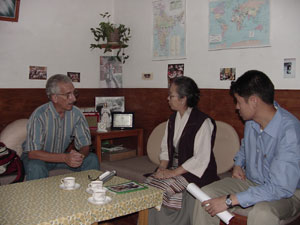 Al: Tashi, you have provided me an excellent
overview of TCV and its mission; it is quite inspiring. I've been truly
moved.
Al: Tashi, you have provided me an excellent
overview of TCV and its mission; it is quite inspiring. I've been truly
moved.
Tashi: That is how we try to live here, but without
the financial support, without the encourage of all the thousands of people
around the world who know the Tibetans and especially the Tibetan Children's
Village work, we could not carry forth our philosophy.
Al: I'll call Dr. Norbu on his birthday. I know he will ask me if I got here.
Thank you also for permission to see some of classrooms and student housing.
I will put this interview and the photos on the Internet. Tashe Delek.
Tashi: I'm glad that I could talk to you. If it
can help the Tibetan cause and the Tibetan Children's Villages, I'm glad.
Tashe Delek.
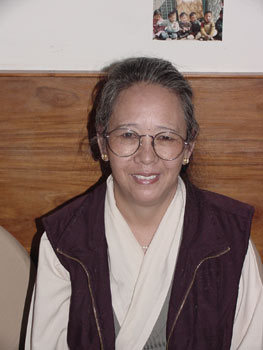
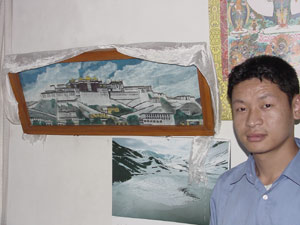
Tenzine was once a student at the
TCV and now works for the Tibetan people in exile.
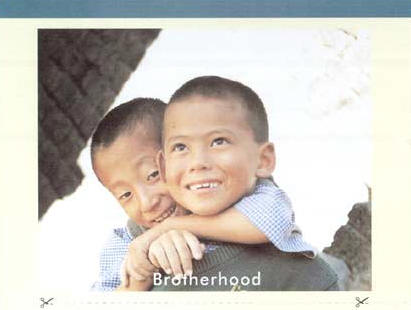
WE NEED YOUR HELP
Please complete the form and send it along with your donation to:
Tibetan Children's
Villages
Dharamsala Cantt. 176216
Distt. Kangra, H.P., India
Name: _____________________________________________
Address: ___________________________________________
-
I would like to sponsor a child @ US $30
or it's equivalent for ____ months
-
I would like to make a financial
contribution. Please find my enclosed check for US $__________
-
Please send me more information
For direct payment please send your monetary contribution to our:
Account # C-310 300 792
American Express Bank
Hamilton House, Connaught Pl.
New Delhi - 110001
INDIA
|








 Al:
I would like you to give my readers and me an overview of the Tibetan
Children's Village. Dr. Norbu, the Dalai Lama's brother, was insistent that
when I got to Dharmasala I would visit TCV. He is looking forward to my
report when I return to the States.
Al:
I would like you to give my readers and me an overview of the Tibetan
Children's Village. Dr. Norbu, the Dalai Lama's brother, was insistent that
when I got to Dharmasala I would visit TCV. He is looking forward to my
report when I return to the States. Al: Can you tell us something about what a day in
the life of a child would be like?
Al: Can you tell us something about what a day in
the life of a child would be like?
 When they get
up in the morning at 5:30, they wash up and then they do their chores around
and then they have classes. By 7:00am, they have to be on the school
premises for morning prayer followed by one-hour of studies. We have two
different programs; we call it the summer program and the normal program.
This time of the year is the summer program, which means school starts already
after 7:00. One-hour period of study and then a break followed by
another two-hour period of school. Then it is lunch break and then there
is no school in the afternoon. In this way, the children get more time
for cultural or other activities after the school period. About 4:00pm,
we have tea and then we go back again on the grounds for games or whatever.
By 6:00pm, they eat and by 6:30 they are ready for another one hour self
study. By 9:00pm, lights should be off.
When they get
up in the morning at 5:30, they wash up and then they do their chores around
and then they have classes. By 7:00am, they have to be on the school
premises for morning prayer followed by one-hour of studies. We have two
different programs; we call it the summer program and the normal program.
This time of the year is the summer program, which means school starts already
after 7:00. One-hour period of study and then a break followed by
another two-hour period of school. Then it is lunch break and then there
is no school in the afternoon. In this way, the children get more time
for cultural or other activities after the school period. About 4:00pm,
we have tea and then we go back again on the grounds for games or whatever.
By 6:00pm, they eat and by 6:30 they are ready for another one hour self
study. By 9:00pm, lights should be off.
 Al: At what age do they go to college?
Al: At what age do they go to college?
 Al: It's not just the transit from Tibet to India;
it's living in Tibet today that can be frightening. When I was in Tibet, I
was afraid to say anything to anyone because I didn't know who they really
were. I wasn't even sure about our Tibetan guides.
Al: It's not just the transit from Tibet to India;
it's living in Tibet today that can be frightening. When I was in Tibet, I
was afraid to say anything to anyone because I didn't know who they really
were. I wasn't even sure about our Tibetan guides. Al: Dr. Norbu is interested in perpetuating Tibetan
cultural and lifestyle. How can you keep religion, culture, and dance alive?
I'm troubled by the fact that Tibetans have two handicaps: one Chinese and
the other is the Internet, television, radio from the West. Society is going
to change. I'm trying to wrestle with what is the essential; you are not
going to save everything in Tibet the cultural things here even if you were
back in Tibet. What are the essentials to make you really Tibetan other than
something else and then how is that carried our here with the children,
because that is really the future.
Al: Dr. Norbu is interested in perpetuating Tibetan
cultural and lifestyle. How can you keep religion, culture, and dance alive?
I'm troubled by the fact that Tibetans have two handicaps: one Chinese and
the other is the Internet, television, radio from the West. Society is going
to change. I'm trying to wrestle with what is the essential; you are not
going to save everything in Tibet the cultural things here even if you were
back in Tibet. What are the essentials to make you really Tibetan other than
something else and then how is that carried our here with the children,
because that is really the future.  Al: Tashi, you have provided me an excellent
overview of TCV and its mission; it is quite inspiring. I've been truly
moved.
Al: Tashi, you have provided me an excellent
overview of TCV and its mission; it is quite inspiring. I've been truly
moved.
